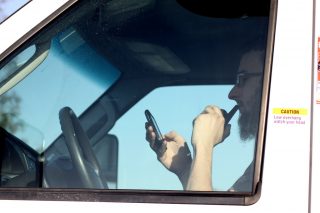
(Photo: Lord Jim)
And we’re back! BikePortland’s vast news empire (both of us, that is) is back in town and ready to kick things off with the bike-related links from around the world that caught our eyes this week:
Blocking texting: A little black box plugged into your steering column can jam your phone while you’re driving so you’re not tempted to use it.
Playable cities: Public waterslides, chalkboard storefronts, live citywide zombie games; the city that plays together stays together, writes The Guardian.
“Officer Joker”: A single Seattle bike cop has written 80 percent of all the city’s citations for public marijuana use.
Toll us, please: 79 percent of U.S. residents would support adding tolls to more highways “if it resulted in a safer, congestion-free and more reliable trip.”
Expensive bike share: The trend of the year in bike share systems, at least unsubsidized ones, is significantly higher prices: $125 a year and $15 a day in San Diego.
Portland’s identity: Miss Oregon 2014 (Rebecca Anderson of Oregon City) wore a bike helmet and shoes with tiny bicycle figurines on them during a Miss America shoe parade.
Licensing requirements: Getting a driver’s license in Germany requires 3 to 6 months of study and thousands of dollars in fees. (video)
Advertisement
Bridge bike lanes: Pittsburgh used some mobile plastic posts to prove last week that it’s really not that hard to test them. (video)
Free parking: “If we make conditions for cycling pleasant, people will choose to cycle even if parking is cheap or free,” writes David Hembrow, armed with pictures of half-empty parking lots in a small Dutch city.
Parking-free prosperity: In the 15 years since Los Angeles killed its rule that auto parking be added during remodels of old downtown buildings, it’s added 20,000 new housing units, a fifth of all new development.
Klein’s next move: Transportation reformer Gabe Klein has a new job — chief operations officer of a startup that operates upscale private urban bus lines.
Mapping street space: Copenhagenize color-codes semi-random overhead photos from Paris, Calgary and Tokyo to show how much space is dedicated to cars and how much is actually occupied by cars.
Institutionalized progress: The federal Department of Transportation is about to release “a road diet guide, an environmental justice handbook, and a cycle track design guide.”
Federal cash: 72 new federal TIGER grants dropped last week. (The Portland area’s winner: $10 million for digital tools to increase Washington County road capacity.)
The singleton surge: Since 1940, the share of U.S. households that consist of one person has more than tripled, to 27 percent. It might be the biggest single factor behind rising suburban poverty.
What do you get when an English town tears all the traffic signals and stripes out of its hectic central intersection in favor of narrowed entrances and textured pavement? One very inspiring video of the week:
If you come across a noteworthy bicycle story, send it in via email, Tweet @bikeportland, or whatever else and we’ll consider adding it to next Monday’s roundup.


